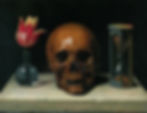a pointless blog

gathering moss


I went 45 years of my life without ever seeing a dead body, and then I saw two in the next two years.
The first dead body I saw was my sister's. She wasn't officially dead yet, but by the time I got to her hospital room, she was brain-dead, only technically still alive because a machine was breathing for her. My mother was already in the room when I arrived. She's right there, my mother said, gesturing to the bed, but she's not IN there.
During the 24+ hours we waited for the final determination to be made (they put you through a lot of tests to make sure you're really brain-dead before they unplug you, as they should) I had plenty of opportunities to think the same thing: she's right there, but she's not IN there. This is just the vessel that used to hold her.
The second body I saw was my father's. He died in his sleep, and my mother called me when she realized. The EMTs beat me there, but his body was still in bed because it was clear there was nothing they could do. I was able to hug him before they took him away. Physically, it felt just like hugging him when he was alive. But he wasn't in there.
The Absurdity of Death
I've never been religious, or believed in a soul. I still don't. But having now been through the confusing experience of seeing, with my own eyes, a person who'd been there my entire life be there but not be there, I understand better the instinct to believe that they must be somewhere. I always assumed it was wishful thinking, a way to avoid accepting that when people die, they're gone. But I understand now that there's more to it than that, because both with my sister and my father, I found myself staring at their abandoned shell and struggling to make sense of it. How could someone have been in there, and then just vanish? Where did they go? What happened to them? They were such complicated beings, so full of fears and hopes and contradictions and laughter and irritation, and you're telling me that all just went poof? That's absurd.
Our brains insist that other people--their personalities, spirits, whatever you want to call it--are real things, just like they insist that we are real things. Real things don't just vanish in an instant. That violates our understanding of the world.
The Absurdity of Life
But you know what does vanish in an instant--or, more precisely, stop in an instant? Chemical reactions. They run out of reagents, or sometime disrupts the chain, and the whole thing just stops.
Where does a candle flame go when you blow it out? Nowhere. It's not gone so much as it is over. Even if you relight the candle, its not the same flame it was before. That flame went out.
To me, the concept of a soul is... I don't want to say a cop-out, but I think that might be what I mean. It's an invented construct that's supposed to fill us with wonder and reverence, while allowing us an easy way out of facing the actual wonder that is the fact that we are just sentient chemical reactions, everyone we know is just a sentient chemical reaction, that our minds-selves-personalities-whatever are just flames, the observable phenomenon that results from mindless chemicals doing what they can't help doing because it is their nature.
How fucking mind-boggling is that?? That's amazing! That's incredible! Compared to that, the concept of an immortal soul feels like a cheap cardboard cut-out. I would rather embrace the knowledge that my chemical reaction will eventually break down, because that allows me to marvel at the fact that it exists at all, that any of this exists. I prefer the incalculable odds against life existing and the astonishment that it does anyway to the belief that I am eternal and all of this has some purpose.
So... what?
Of course, that's not to say that I believe nothing matters because its all just chemical reactions. We're sentient chemical reactions with subjective feelings and the ability to suffer. We owe it to each other not to increase that suffering. When the chemical reactions we love stop working, we miss them. It's hard to accept that nothing will restart them. When you relight a candle, its not the same flame it was before. That flame went out.
But for me, it helps to know that their molecules continue to do what is in their nature to do. They will rise into the air on plumes of smoke, or dissolve into the soil. They will get involved in new reactions, just as they have for billions of years, since they were first created in the stars.
To put it in Buddhist parlance, we are the wave, but we are also the water. When we stop being the wave, we will still be the water.


